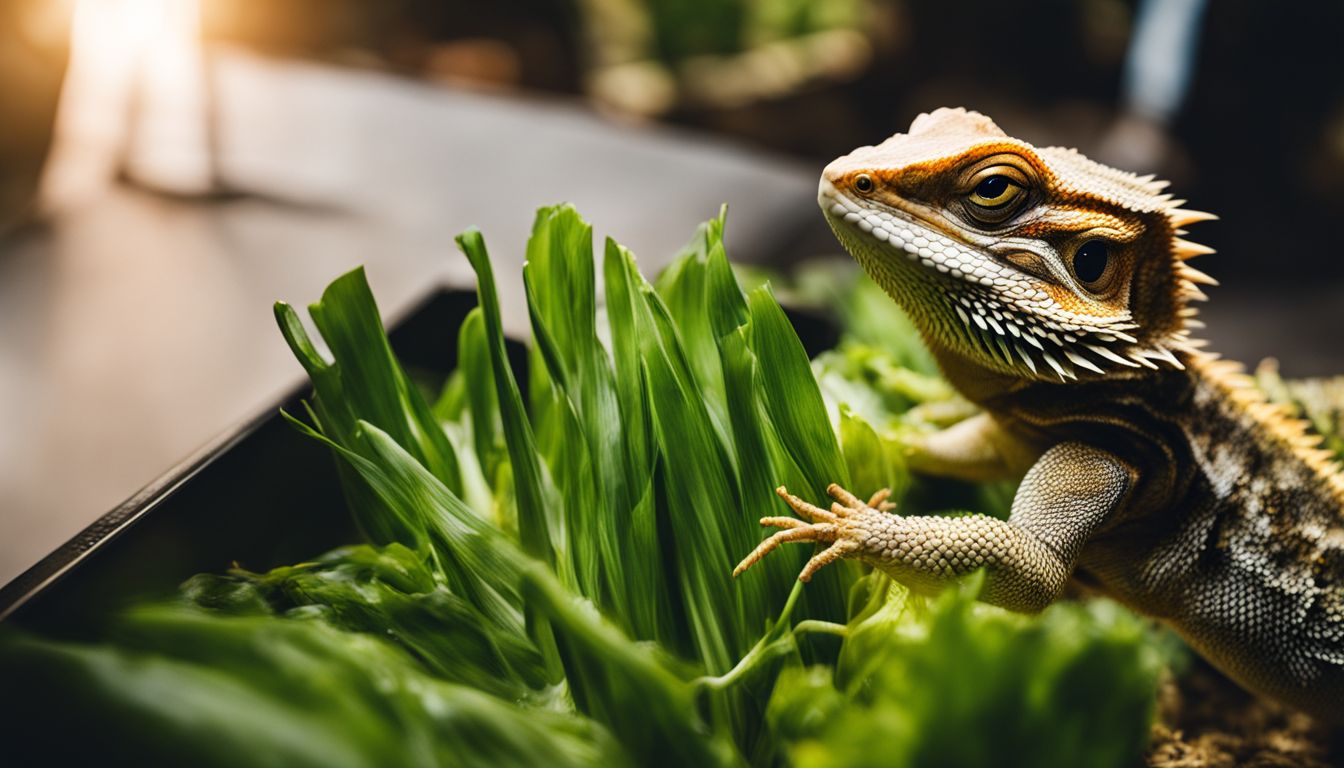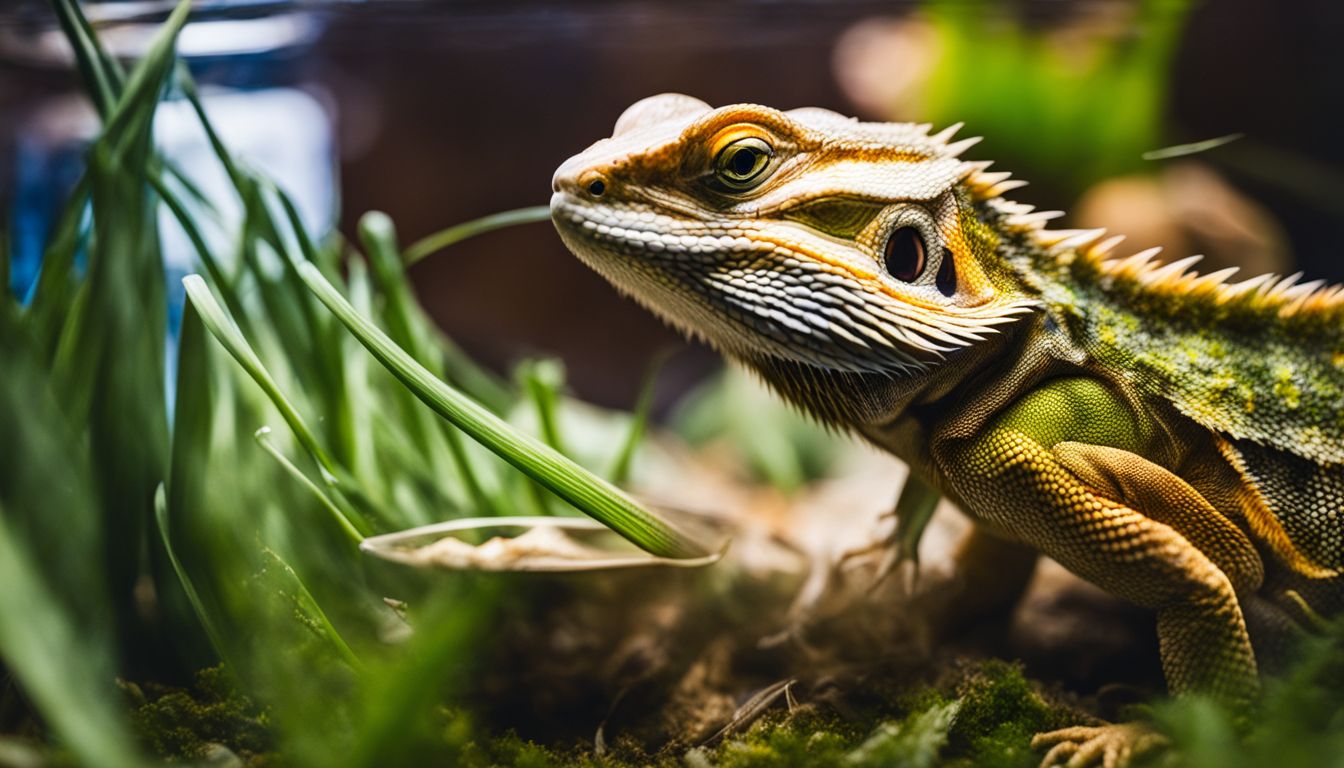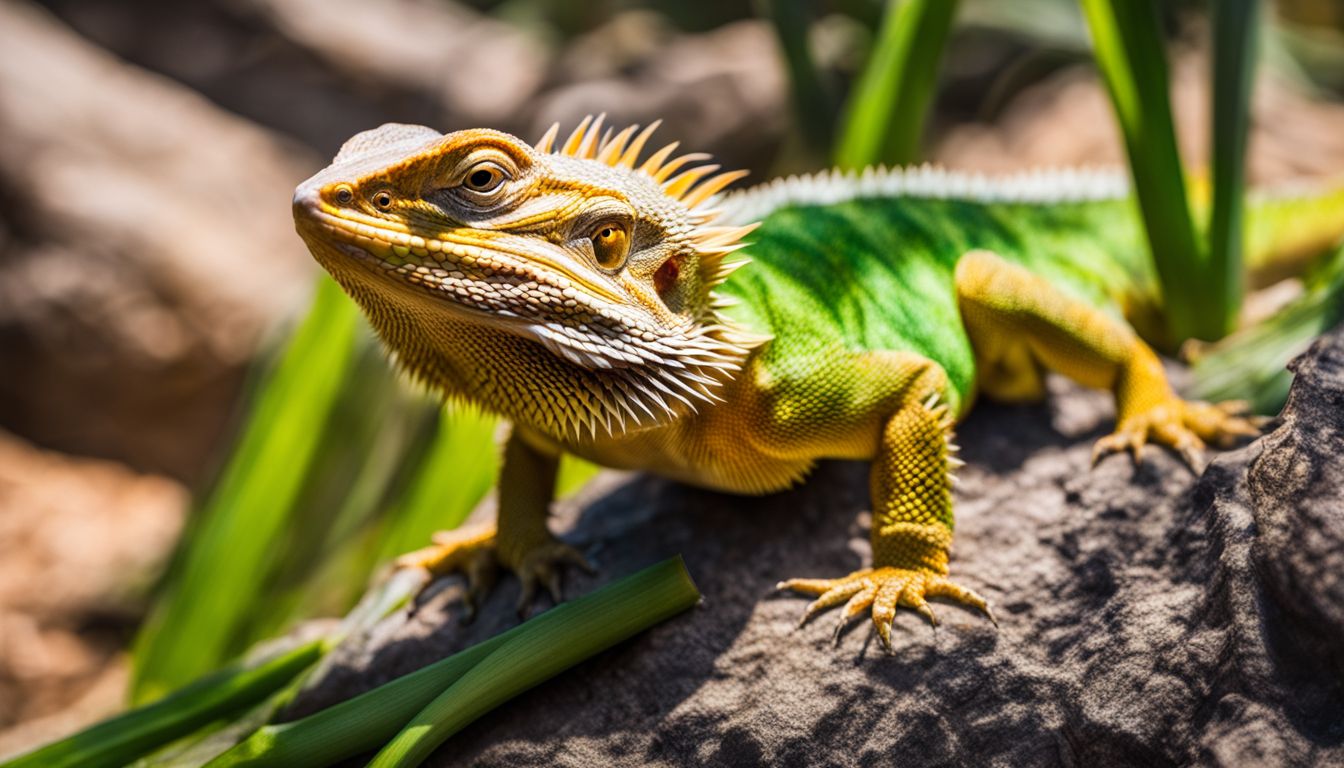Wondering if you can share your love of leeks with your bearded dragon? Interestingly, the green parts of leeks are safe for them. This blog will guide you through the proper way to feed leeks to your pet, offering a safe treat option.
Read on—you might find it surprising!
Can Bearded Dragons Eat Leeks?

Bearded dragons can eat leeks, but there’s a catch. Only the green part of the leek is safe for them. The white part, on the other hand, should be avoided as it’s not suitable for their digestion.
This distinction is crucial for keeping your reptile friend healthy and happy.
Leeks are high in oxalates which pose a risk to bearded dragons if consumed in large amounts. High oxalate levels can lead to metabolic bone disease, among other health issues. Therefore, moderation and proper preparation are key when introducing leeks into their diet.
Next up: Let’s explore the benefits that these green parts of leeks hold for your scaly companion.
Benefits of Leeks for Bearded Dragons

Leeks pack a punch of fiber, making them great for your bearded dragon’s digestive health. This veggie helps prevent constipation, ensuring that your pet maintains regular bowel movements.
Plus, the high moisture content in leeks is perfect for hydration. Keeping your bearded dragon hydrated is key to their overall health.
These vegetables also offer calcium, protein, and vital vitamins which contribute to a balanced diet. Feeding leeks in moderation can supplement your bearded dragon’s nutritional needs effectively.
They’re especially beneficial when you want to mix up the veggies in their diet without compromising on reptile care essentials like calcium sources and vitamin-rich foods.
Risks of Feeding Leeks to Bearded Dragons
While leeks offer certain benefits to humans, they don’t have the same effect on bearded dragons. These reptiles face serious health risks when fed leeks due to their unique digestive systems.
Feeding your bearded dragon leeks can lead to severe anemia and liver toxicity because of substances that cause red blood cells to burst. This isn’t just a minor issue; it’s a critical one that could significantly impact your pet’s health.
High oxalate levels in vegetables like leeks are another concern for these pets. Oxalates bind with calcium, creating deficiencies and leading to metabolic bone disease—a common yet preventable condition in bearded dragons.
And since onions—which share many properties with leeks—are harmful too, it’s clear that this family of vegetables poses real risks. Digestive problems also arise from feeding them these veggies, making it important to choose safer alternatives for their diet.
How to Properly Feed Leeks to Your Bearded Dragon
Feed only the green part in small pieces..to ensure easy digestion and avoid choking hazards.
Only the green part
Bearded dragons should only eat the green part of leeks, as it provides them with essential nutrients. The green part is safer for their digestive system and contains valuable vitamins and minerals crucial for their health.
Remember to cut the green part into small pieces to make it easier for your bearded dragon to eat and digest.
Now let’s talk about how you can incorporate other vegetables into your bearded dragon’s diet..
Cut into small pieces
Leeks should be cut into small pieces before feeding them to your bearded dragon. This helps prevent choking and makes it easier for your pet to eat. Chopped leeks are safer for their digestive health, reducing the risk of any potential issues arising from large food pieces.
Other Vegetables Better for Bearded Dragons
Bearded dragons can also benefit from other vegetables, such as spinach and celery. These options provide essential nutrients for your bearded dragon’s health and well-being.
Spinach
Spinach is a nutritious leafy green that can be fed to your bearded dragon. It has a high calcium content, making it beneficial for their diet. However, spinach also contains oxalic acids which can affect the health of your lizard if consumed in excess due to its high amount of oxalates.
This could lead to kidney stones and calcium issues, so moderation is key when offering spinach to your bearded dragon.
Here’s what you need to know about feeding spinach: while it’s rich in essential nutrients like calcium, its oxalic acid levels can pose potential risks for your pet’s health. Ensuring a well-balanced diet for them is crucial – including other vegetables with lower oxalate contents would be ideal.
Cabbage
Cabbage is a safe and nutritious vegetable for bearded dragons. It is low in fat and sugar, making it a suitable option for your pet reptile. Both green and red cabbage can be fed to bearded dragons in moderation without posing any risk of obesity or health problems.
This nutrient-rich vegetable can provide a variety in your pet’s diet, offering them essential vitamins and minerals necessary for their well-being.
When it comes to feeding cabbage to your bearded dragon, remember that moderation is key. Always ensure the vegetables are cut into small pieces before offering them to your pet. Now let’s explore another safe vegetable option – celery – for your bearded dragon’s diet.
Celery
Celery is safe for bearded dragons to eat, but it doesn’t provide many essential nutrients that they need. It has high fiber content, with one cup offering 1.5 grams of fiber. Ensure the celery is prepared well and offer it as an occasional snack to your pet reptile.
Other vegetables are better suited for bearded dragons’ nutrition needs than celery, such as spinach and cabbage. Additionally, when feeding leeks to your bearded dragon, ensure you only offer the green part cut into small pieces for consumption..Moving on from vegetables, let’s explore which foods should be avoided altogether for your pet reptile..
Foods to Avoid for Bearded Dragons
Avoid feeding bearded dragons onions, including leeks due to potential health issues. Be mindful of oxalates in their diet and limit high-oxalate foods like spinach, cabbage, and celery.
Moderation is key for a balanced and safe diet for bearded dragons.
Ideal Bearded Dragon Diet
A balanced diet for your bearded dragon includes a mix of fruits, vegetables, and insects to ensure their nutritional needs are met – learn more about crafting the perfect diet for your scaly friend!
Balance of fruits, vegetables, and insects
A balanced diet for your bearded dragon includes a mix of vegetables, fruits, and insects. Leafy greens like collard greens, mustard greens, and dandelion greens are great options.
These provide necessary vitamins and minerals while keeping the calcium-phosphorus ratio in check.
Carefully incorporating fruits like blueberries or apples can add variety to their diet and some essential nutrients – but it’s important to remember that they should be given sparingly due to their high sugar content.
Conclusion
In conclusion, while bearded dragons can eat leeks, it’s crucial to feed them only the green part in small amounts. Monitor their health for any adverse effects and consult a veterinarian before introducing leeks into their diet.
Consider other safe vegetables like spinach, cabbage, and celery as better options for your bearded dragon’s nutrition. Remember that a balanced diet of fruits, vegetables, and insects is essential for your pet’s well-being.
Always prioritize your bearded dragon’s health when making feeding decisions.
After learning about feeding leeks to your bearded dragon, you might also be curious if bearded dragons can eat olives.
FAQs
1. Can bearded dragons eat leeks?
Yes, bearded dragons can eat leeks as an occasional treat, but they should not make up a significant part of their diet.
2. Are leeks safe for bearded dragons to consume?
Leeks are safe for bearded dragons in small amounts, but excessive consumption can lead to digestive issues due to their high fiber content.
3. How should I prepare leeks for my bearded dragon?
Before feeding leeks to your bearded dragon, ensure they are thoroughly washed and chopped into small, manageable pieces.
4. What are the potential risks of feeding leeks to my bearded dragon?
Feeding too many leeks can cause digestive problems or even lead to nutrient imbalances in a bearded dragon’s diet.
5. How often can I give leeks to my pet bearded dragon?
It is recommended to offer leeks as an occasional treat rather than a regular part of their diet – once every few weeks is sufficient.




